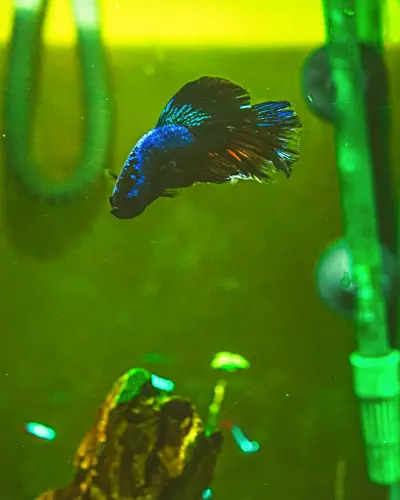Betta fish are beautiful and captivating creatures that make great pets. However, owning a Betta fish in filtered tank requires proper care and attention.
Several common mistakes can harm your Betta fish in filtered tanks, and knowing how to avoid them is essential. One of the significant factors in keeping Betta fish healthy is ensuring they have a suitable filtered betta fish tank.
A filtered tank for betta fish is essential as it helps maintain water quality, which is crucial for the health of your fish.
However, choosing the wrong tank size or type of filter can cause problems, which we will cover in this blog post. Another common mistake is failing to regularly clean the filtered tank for betta fish.
Poor tank water quality can lead to various health issues for your fish, such as fin rot or swim bladder disease. Overfeeding your Betta fish is a common mistake that can cause digestive problems and pollute the water.

Ignoring the water temperature in your filtered tank can cause illness in your Betta fish. And lastly, not selecting the right power filter type for your Betta fish can cause physical harm or water quality problems.
In this blog post, we’ll discuss these common mistakes in detail and provide secret tips on how to avoid them. By the end of this article, you’ll better understand how to care for your Betta fish in a filtered tank and provide them with a healthy and happy environment.
Table of Contents
ToggleDoes a Betta Need a Filter?
Do bettas need a filter? You might want to reconsider if you’re considering keeping a betta in a smaller tank or bowl without a filter.
Like all tropical fish, Betta fish have specific water requirements to thrive. Without proper filtration, the water in a betta bowl can quickly become contaminated with toxins that can harm your fish.
A filter in a betta tank helps to remove these harmful toxins by providing mechanical and biological filtration.

A low-flow mechanical filter is ideal for betta fish, as a strong current can damage their delicate fins. Betta fish also require a heater to maintain a temperature of approximately 78-80°F.
Keeping a betta in a large, filtered fish tank with proper temperature regulation will help to ensure their overall health and longevity. So the answer is clear: a betta needs a filter to live a healthy, happy life.
Introduction: The Importance of Filter for A Betta Fish
Betta fish are popular pets known for their vibrant colors and flowing fins. To ensure their well-being and longevity, it’sit’s crucial to provide them with a suitable environment.
One essential component of a betta tank is a filter. This article will discuss the mistakes that harm betta fish in a filtered tank and how to avoid them.
Common Mistakes That Harm Your Betta Fish in a Filtered Tank
When it comes to keeping Betta fish in the filtered tank, there are a few common mistakes that many fish owners tend to make. Depend on the size of the filter; These mistakes can have detrimental effects on the health and well-being of these beautiful and vibrant fish.
- Overly strong water flow: A common mistake is using a tank filter with a high flow rate, which can cause stress and exhaustion for Betta fish. Opt for filters with adjustable flow settings or add a pre-filter sponge to reduce the current.
- Inadequate filter media: Using incorrect or insufficient filter media can lead to poor water quality. Include biological, mechanical, and chemical filtration components to maintain a balanced and clean tank environment.
- Lack of regular maintenance: Neglecting regular filter maintenance can result in clogged or inefficient filters, leading to water contamination and decreased oxygen levels. Clean or replace filter media as recommended to ensure optimal functioning.
- Ignoring water temperature: Betta fish are tropical species and require stable water temperatures between 78-80°F (25-27°C). Failure to maintain the appropriate temperature can weaken the betta immune system, making them more susceptible to diseases.
- Skipping the nitrogen cycle: Starting a new tank without properly cycling can harm your Betta fish. The nitrogen cycle establishes beneficial bacteria that break down toxic ammonia, ensuring a safe and healthy environment. Allow the tank to cycle completely before introducing your fish.
By avoiding these critical mistakes, you can create a well-maintained and thriving environment for your Betta fish in a filtered tank.
By being aware of these vital issues, you can ensure a thriving and happy environment for your Betta fish:
Mistake1: Not Providing a Proper Filter
Betta Fish Need a Filter for a Healthy Environment
Like other aquatic species, Betta fish produce waste and release toxins into the water. Without proper filtration, these waste materials accumulate and degrade the water quality, leading to stress and illness in betta fish. A low-flow filter helps to remove impurities, keep the water clean, and create a stable and healthy environment while keeping betta fish without a filter.
The Role of Filtration in a Betta Fish Tank
Filtration plays a vital role in maintaining water quality in bettas tanks. It removes physical debris, such as uneaten food and fish waste, and chemical substances like ammonia and nitrites. These harmful substances can quickly build up and poison the fish if not adequately filtered. Additionally, a low flow filter promotes the growth of beneficial bacteria that help collapse toxic compounds into less harmful substances.
Choosing the Right Filter for Your Betta Fish
When selecting a filter for your betta tank, consider the Exact size of the tank and the filter’s flow rate. Betta fish prefer calm tank water, so using a filter with a low or adjustable flow rate is essential. A gentle current will prevent your betta fish from getting stressed or exhausted while swimming. Sponge filters or filters with adjustable water flows settings are often suitable options for betta fish aquariums.
Mistake 2: Using an Inadequate Filter
Understanding the Different Types of Filters
Different filter media are available for aquariums, including hang-on-back, canister, and sponge filters. Each type has advantages and disadvantages, but not all suit betta fish tanks. Choosing a filter that provides adequate filtration without creating a strong water current that can stress or harm your betta is crucial.
The Best Filters for Betta Fish Tanks
For betta fish tanks, sponge filters are highly recommended and considered is best betta filter. They provide gentle filtration and are easy to maintain. Sponge filters draw water through a sponge, which traps debris and provides a surface for beneficial bacteria to colonize. They also offer aeration, ensuring a good oxygen exchange for your betta fish.
Avoiding Filters with Strong Currents
Betta fish are native to calm, slow-moving waters, such as rice paddies and shallow streams. Strong tank water currents can exhaust and stress them, making it challenging for them to swim and breathe comfortably. It’s crucial to avoid filters with powerful currents or adjust them to a lower flow rate to prevent any harm to your betta fish.
Mistake 3: Neglecting Filter Tank Maintenance
– Importance of Regular Filter Cleaning
Proper filter maintenance is essential for its optimal performance and the well-being of your betta fish. Filters can become plugged with debris over time, reducing their efficiency. It’s crucial to clean the filter regularly according to the manufacturer’s instructions. This usually involves rinsing the aquarium water filter media and removing accumulated waste.
– Replacing Filter Media
Filter media, such as sponges or filter cartridges, may need to be replaced periodically. Over time, a Filter Media can become worn out or clogged, diminishing their filtration capabilities. Follow the manufacturer’s guidelines regarding the replacement schedule for the filter media to ensure effective filtration in your betta fish tank.
– The Dangers of Clogged Filters
A clogged filter compromises the water quality and risks your betta fish. When the filter cannot function correctly, waste materials accumulate, leading to increased levels of ammonia and nitrites in the water. These substances are a high hazard to fish and can cause stress, illness, and even death. Regular maintenance and cleaning of your filter also vital to prevent such issues.
Mistake 4: Combining a Betta Fish with Unsuitable Tankmates
Betta Fish and Tank Mate Compatibility
Betta fish are often known for their territorial nature, and not all fish make suitable tankmates for them. It’s essential to consider the compatibility of tankmates before adding them to a bettas tank. Some fish species may nip at the betta’s fins, become aggressive toward them, or outcompete them for food.
Choosing Compatible Tankmates for Betta Fish
When selecting tankmates for your betta fish, opt for peaceful, slow-swimming fish that can tolerate the same water conditions. Some suitable tank mates include small schooling fish like neon tetras, ember tetras, or rasboras. However, monitor the interactions between the betta and tankmates closely and be prepared to separate them if any aggression occurs.
Avoiding Aggressive Tankmates
Avoid adding aggressive or fin-nipping fish species, such as tiger barbs or aggressive cichlids, to a betta aquarium, as they can cause stress and harm your betta fish. Aggressive tankmates may nip at the betta’s delicate fins or constantly provoke territorial conflicts, leading to injuries and distress. It’s crucial to research the behavior and compatibility of potential tankmates to ensure a peaceful and harmonious tank environment for your betta fish.
Mistake 5: Overlooking the Need for a Heater
– Bettas Need a Heater for Optimal Temperature
Betta fish are tropical fish that require stable and warm water temperatures to thrive. They are most comfortable in water between 78 to 82 degrees Fahrenheit (25 to 28 degrees Celsius). Without a heater or filter, the water temperature can fluctuate, stressing your betta fish and compromising their immune system, making betta more liable to diseases.
– The Ideal Temperature Range for Betta Fish
Maintaining the proper temperature range is crucial for your betta fish’s health and well-being. Consistently cold water can lead to sluggishness, poor appetite, and illness. On the other hand, ultimately, high temperatures can cause stress, oxygen depletion, and potentially fatal conditions. A heater helps maintain a stable and suitable temperature range for your betta fish.
– Selecting the Right Heater for Your Betta Fish Tank
When buying a heater for your betta fish tank, opt for a reliable and adjustable aquarium heater specifically designed for small tanks. Selecting a heater with a built-in thermostat that can maintain a proportionate temperature within the desired range is essential. Regularly monitor the water temperature using a reliable thermometer to ensure it remains within the optimal range for your betta fish.
What Is the Ideal Betta Fish Tank?
The ideal Betta fish tank should provide ample space and comfort for the fish to thrive. A betta tank of at least 5 gallons is advised to keep your Betta healthy and happy. However, a bigger fish tank is always better.
The Betta fish tank should be well equipped with a filter to maintain water quality and keep the fish healthy. A heater is also necessary to keep the water temperature at around 78-80 degrees Fahrenheit, as the Betta requires warm water.
It’s safer for the fish to regularly clean the tank to maintain water quality and prevent the growth of harmful bacteria. Providing hiding places like live plants, rocks, and caves will also help to reduce stress and create a comfortable environment for the fish.
Providing an adequately sized, clean, and filtered betta tank will increase the chances of your Betta living a long and healthy life.
Can Betta Fish Survive Without a Filter?
Betta fish are known as a hardy and resilient species, but can they survive without a filter? Well, technically, yes, but it’s not recommended. If you intend to keep your betta in a bowl, it should be at least two and a half to three gallons in size, but without a filtration system, the water can quickly become contaminated.
Filtration is essential to keep the tank clean and healthy, as it helps to remove waste products and harmful bacteria.
Additionally, the filter media serves as a breeding ground for beneficial bacteria in the filter, which play a dynamic role in the nitrogen cycle. Without filter, the water stagnates, creating a breeding ground for harmful bacteria, leading to health issues.
Also, most aquarium filters have a flow control feature to prevent strong currents, which can harm betta fish as they prefer slow-moving water. Therefore, having an aquarium gravel filter in their tank is highly advisable.
What Happens To Your Betta Tank Without An Aquarium Filter?
Without an aquarium filter, your tank can quickly become a toxic environment for your fish. Bacteria, uneaten food, and fish waste accumulate in the water, creating high ammonia, nitrite, and nitrate levels. These compounds are highly toxic to fish and can ultimately lead to their death.
Additionally, a betta fish tank without a filter cannot remove debris and free-floating particles from the water, making it cloudy and unappealing.
The lack of filtration also means that any beneficial bacteria colonies that may have developed in the tank may die off, making it even harder to create a healthy home for your fish.
Without a filter, you’ll need to perform frequent water changes to keep your tank clean, which can be time-consuming and frustrating. Ultimately, a tank without an aquarium filter can stress your betta fish and make it difficult for them to thrive.
How to Choose the Best Filtered Betta Fish Tank?
The best filtered Betta fish tank provides a suitable and comfortable habitat for your Betta while maintaining excellent water quality.
Look for a tank with a gentle filter, adjustable flow settings, and a small footprint to avoid stressing the fish. Opt for tanks with built-in filtration systems designed specifically for Betta fish to ensure proper care and a healthy environment.
Frequently Asked Questions about Betta Fish in Filtered Tank (FAQs)
Can betta fish survive without a filter?
While betta fish can survive without a water filter, it is not ideal for their health and well-being. Filters help maintain water quality by removing waste and toxins, promoting a healthier environment for your betta fish.
What happens if I keep my betta fish in a small bowl without a filter?
Keeping a betta fish in a small bowl without a filter can lead to poor water quality due to waste accumulation. This can result in stress, illness, and a shortened lifespan for your betta fish.
Do betta fish need a heater?
Yes, betta fish need a heater, and filter to maintain a stable and suitable temperature range. They are tropical fish that seek warm water for optimal health and well-being.
Can bettas live in a tank without an aquarium filter?
While betta fish can live without a filter, it is not recommended. Filters help maintain water quality and create a healthier environment, promoting the overall well-being of betta fish.
How important is filtration for betta fish?
Filtration is crucial for betta fish as it helps remove waste, toxins, and harmful substances from the water. It promotes water clarity, stability, and a healthy environment for betta fish, ensuring their long-term well-being.
Is Activated Carbon Good to Filter Water?
An aquarium filter with granular activated carbon (GAC) is a reliable choice for effectively eliminating specific chemicals, especially organic compounds, from water. It has been highly tested and proven to remove these substances, ensuring cleaner and safer water efficiency.
Conclusion
In conclusion, owning a Betta fish in a filtered tank is a responsibility that requires proper care and attention. Avoiding common mistakes such as choosing the right filtered betta fish tank size, cleaning the filter tank regularly, and feeding them can help maintain water quality and ensure your fish’s health and happiness. It’s also essential to monitor the water temperature in your filtered tank for betta fish and select the right filter type for your Betta fish’s needs. By following these simple hacks, you can provide your Betta fish with a healthy and happy environment that allows them to thrive.
Remember, owning a Betta fish in a filtered tank is not just a hobby; it’s a commitment to your pet’s well-being. By caring for their basic Bettas tank needs, you can enjoy the beauty and companionship of your Betta fish for years to come. We hope this Exclusive blog post has helped guide you on avoiding common mistakes and caring for your Betta fish in filtered tank. If you have any other queries, or a comment please leave them below. Thank you for reading, and happy Betta fish keeping!
You might also like
- How Often to Change Betta Tank Water Without Filter: (5 Pro Tips)
- How to Care of Betta Fish without a Tank Filter: (Solved)
- How Big of a Fish Tank Does a Betta Needs: (Exclusive Guide)
- How to Know If My Betta Fish Is Dying: (5 Warning Signs)
- Betta Fish Not Eating and Laying at the Bottom: 3 Reasons Solved
- Can Betta Fish Live in a Small tank or Bowl Without Filter? (Solved)
- Can Betta Fish Have a Filter in Their Tank: (Exclusive Guide)
- How Often Will Bettas Breed: 5 Simple Tips to Boost Fertility




